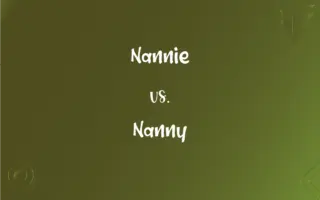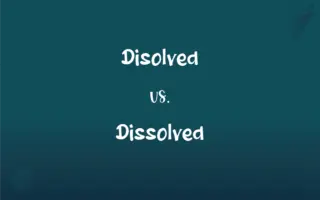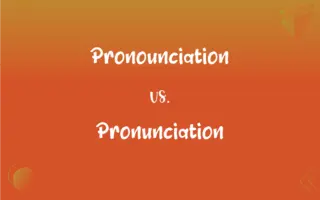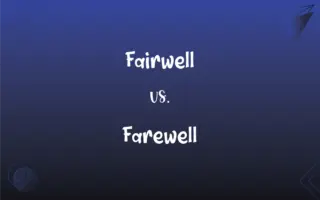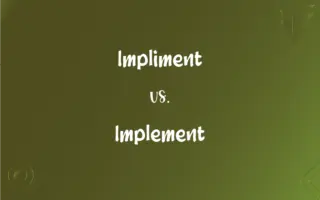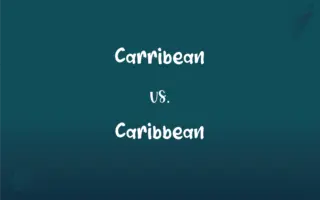Whoose vs. Whose: Mastering the Correct Spelling
Edited by Harlon Moss || By Janet White || Updated on March 10, 2024
"Whoose" is incorrect; the correct spelling is "Whose," which is a possessive form of "who," referring to ownership or association.
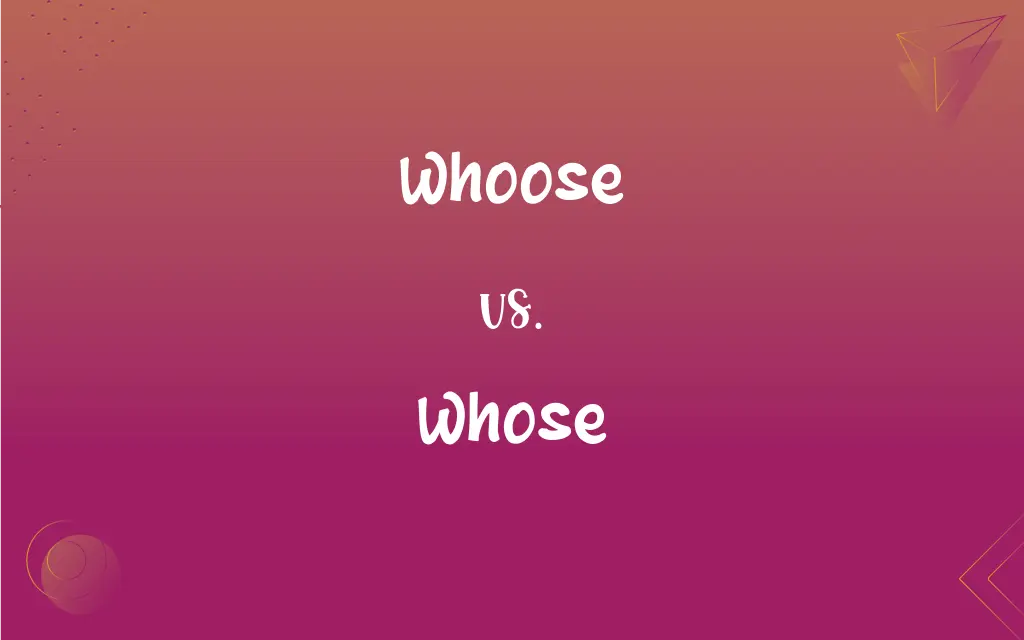
Which is correct: Whoose or Whose
How to spell Whose?

Whoose is Incorrect

Whose is Correct
ADVERTISEMENT
Key Differences
Relate "Whose" to possession as it is used to inquire or describe ownership or association.
Pronounce it as /huːz/ to remember the correct structure.
Remember "Whose" by associating it with “who,” focusing on the basic form of the word.
Think of "use" in "Whose" to avoid the incorrect addition of an extra "o."
Practice writing the word to engrain the correct spelling in memory.
ADVERTISEMENT
Correct usage of Whose
Whose book is this on the table?
Whose turn is it to wash the dishes?
We need to find out whoose car is parked illegally.
We need to find out whose car is parked illegally.
Can you tell me whoose project this is?
Can you tell me whose project this is?
I wonder whoose idea was to start early.
I wonder whose idea was to start early.
Whose Definitions
Possessive form of "who," used to attribute ownership.
Whose book is this?
Used in questions to ask about ownership or relationship.
Whose idea was it to come here?
It can be used to introduce a clause in which the antecedent is unknown.
I wonder whose coat this is.
Utilized to specify defining characteristics or qualities.
He’s a man whose opinion I respect.
Referring to a person of whom or which something is possessed.
Find a manager whose team needs help.
Whose Sentences
He's the scientist whose discovery changed the field.
Whose idea was it to come here?
Whose backpack is left in the classroom?
Whose phone keeps ringing during the meeting?
We found a dog whose collar had no tags.
Whose job is it to clean the windows?
Whose shoes are these by the door?
She's looking for the owner whose cat is lost.
I met a woman whose brother knows you.
They couldn't remember whose turn it was.
The teacher, whose patience is admirable, handled the situation well.
Whose handwriting is on this note?
Whose responsibility is it to lock up?
That's the author whose books I recommended.
They live in the house whose roof is red.
Whose keys are on the table?
He has a story whose ending will surprise you.
The player, whose injury was serious, missed the final game.
Whose bicycle is blocking the driveway?
I have a friend whose father is a chef.
The company, whose headquarters are in New York, is expanding.
Whose decision was it to cancel the trip?
Whose glasses are these?
The teacher asked whose project was left on the desk.
Whose coat is this on the chair?
Whose Idioms & Phrases
Whose who
A phrase used to inquire about the identity or affiliations of people involved in a situation.
At the gala, newcomers were asking, Whose who, to understand the relationships and status of the attendees.
Whose call is that to make?
Questioning who has the authority or responsibility to make a decision.
When the team couldn't agree, someone asked, Whose call is that to make?
Whose problem is this?
Inquiring who should be concerned or responsible for resolving an issue.
Faced with the unexpected challenge, they asked, Whose problem is this?
Whose line is it anyway?
A phrase questioning who is supposed to speak or act next, popularized by a comedy show of the same name.
During the rehearsal, there was confusion, prompting someone to ask, Whose line is it anyway?
Whose fault is that?
Asking who is to blame for a mistake or problem.
After the mishap, the question arose, Whose fault is that?
Whose idea was this?
Questioning the origin of a plan or suggestion.
Seeing the outcome, she couldn't help but ask, Whose idea was this?
Whose mouth is watering?
Indicating something is very appetizing or desirable.
As the cake was served, he joked, Whose mouth is watering now?
Whose word do we take?
Questioning which person's statement or advice should be trusted.
Faced with conflicting stories, the dilemma was, Whose word do we take?
Whose bread I eat, his song I sing
One supports or praises the person from whom they receive support or sustenance.
He always agrees with his boss, clearly demonstrating the principle of whose bread I eat, his song I sing.
Whose side are you on?
Asking someone to declare their loyalty or support in a dispute.
During the debate, he turned and asked, Whose side are you on?
Whose name is on it?
Asking who owns something or who is officially responsible.
When they found the misplaced report, they wondered, Whose name is on it?
Whose game is it?
Asking who is in control or has the upper hand in a situation.
As the competition intensified, spectators mused, Whose game is it?
Whose turn is it?
Asking who is next in sequence for an action or task.
At the game night, the question came up often: Whose turn is it?
Whose ears are burning?
Suggesting that someone is being talked about when they're not present, based on the superstition that one's ears burn in such situations.
I bet his ears are burning, she said, implying someone was discussing him.
Whose big idea was that?
A sarcastic or humorous way to ask who came up with a particular idea, usually after it has failed or caused problems.
After the plan backfired, he asked, Whose big idea was that?
Whose name goes first?
Questioning the order of names in a list, presentation, or document, often concerning priority or protocol.
Preparing the invitation, they debated, Whose name goes first?
Whose number is up?
Suggesting that someone's luck has run out or their end is near.
With the villain closing in, it seemed like the hero's number was up.
Whose voice is missing?
Highlighting the absence or exclusion of someone's perspective or input.
In the discussion on equality, she asked, Whose voice is missing?
Whose story is this?
Inquiring about the main character or focus of a narrative.
Analyzing the novel, the teacher asked the class, Whose story is this?
Whose heart isn't in it?
Asking who is not fully committed or enthusiastic about something.
Noticing the lackluster performance, the coach wondered, Whose heart isn't in it?
FAQs
What is the verb form of Whose?
Whose is not a verb; it’s a possessive interrogative pronoun.
Which vowel is used before Whose?
The vowel “o” is used in "Whose."
What is the root word of Whose?
The root word of "Whose" is "who."
What is the singular form of Whose?
Whose is both singular and plural; it doesn’t have a separate form.
Is Whose a negative or positive word?
Whose is neutral; it’s neither negative nor positive.
Why is it called Whose?
It is called "Whose" as it is the possessive form of the pronoun "who," denoting ownership or association.
Which conjunction is used with Whose?
Any conjunction can be used with "Whose," depending on the sentence structure.
What is the pronunciation of Whose?
Whose is pronounced as /huːz/.
Which preposition is used with Whose?
There isn’t a specific preposition that is used with "Whose"; it depends on the sentence.
Is Whose a vowel or consonant?
The word "Whose" contains both vowels and consonants.
Is Whose a collective noun?
No, Whose is not a collective noun.
What is the plural form of Whose?
Whose serves as both singular and plural.
Which article is used with Whose?
Whose doesn’t typically take an article as it’s a pronoun.
Is Whose a noun or adjective?
Whose is a possessive interrogative pronoun and can also function as a relative pronoun.
Is Whose an abstract noun?
No, Whose is not an abstract noun.
What part of speech is Whose?
Whose is a pronoun.
What is another term for Whose?
Another term for Whose could be “of whom.”
How do we divide Whose into syllables?
Whose is one syllable and cannot be divided.
What is the third form of Whose?
Whose is constant and does not have different forms.
Is Whose an adverb?
No, Whose is not an adverb.
Is the Whose term a metaphor?
No, Whose is not used as a metaphor.
Is the word Whose imperative?
No, Whose is not imperative.
How many syllables are in Whose?
Whose has one syllable.
Which determiner is used with Whose?
Whose itself is a determiner and does not require another determiner.
What is the second form of Whose?
Whose remains the same; it doesn’t have different forms.
Is Whose a countable noun?
No, Whose is not a noun; it’s a pronoun.
What is the opposite of Whose?
Whose doesn’t have a direct opposite as it’s a possessive interrogative pronoun.
How is Whose used in a sentence?
"Whose responsibility is it to ensure that the task is completed on time?"
What is a stressed syllable in Whose?
The whole word "Whose" is stressed as it’s only one syllable.
What is the first form of Whose?
Whose does not have different forms like a verb does; it’s a pronoun.
About Author
Written by
Janet WhiteJanet White has been an esteemed writer and blogger for Difference Wiki. Holding a Master's degree in Science and Medical Journalism from the prestigious Boston University, she has consistently demonstrated her expertise and passion for her field. When she's not immersed in her work, Janet relishes her time exercising, delving into a good book, and cherishing moments with friends and family.
Edited by
Harlon MossHarlon is a seasoned quality moderator and accomplished content writer for Difference Wiki. An alumnus of the prestigious University of California, he earned his degree in Computer Science. Leveraging his academic background, Harlon brings a meticulous and informed perspective to his work, ensuring content accuracy and excellence.
